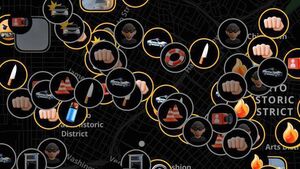Ye can't be doing that...US-style Garda Patrol

The Citizen app is a mobile crime-tracking tool that maps out “incidents” happening nearby.
The other night I was out for a short walk around the block here in Glendale - a simple ritual to clear the head and digest the last of the dinner. It was one of those beautiful L.A. sunset evenings when even the palm trees seem to be half-asleep. Quiet. Still.
Until it wasn’t. The growing buzzing sound revealed three helicopters, hovering low and steady in the distance, just a few blocks south toward Griffith Park. The thudding of their blades filled the air, followed by the faint but urgent wail of sirens, which soon erupted into blaring police cars tearing past me and apparently headed towards them.
And then my phone rang. It was my wife, calling from bed. Her Ukrainian accent makes even gentle requests to pass the salt sound like Stalin ordering the invasion of Poland. But this was no gentle request.
“Someone’s just been shot dead. Get back home. Now!”
She wasn’t watching the news. She was reading a real-time alert from her Citizen app - a mobile crime-tracking tool on her phone that maps out “incidents” happening nearby. She’d received a push notification with geolocation, an incident report and comments from others watching it unfold. All while I was gaping up at the helicopters.
Apparently, I’d been walking a few hundred metres away from a fatal shooting - and she knew before I did, terrified I would somehow get involved. Though, my rush home was less about the chances of being shot and more about not antagonising the boss.
The Citizen app launched in New York in 2016, originally under the name Vigilante, but was quickly banned from app stores for encouraging people to chase down suspects and film crimes in progress. Later, it re-emerged as Citizen, with a new coat of civic-minded paint and expanding to cities like L.A., San Francisco and Chicago. Its premise is simple: to keep you safe by keeping you informed. But in practice, it can feel more like gamified paranoia, gossiping and voyeurism.
Alerts ping constantly.
“Man with knife seen near parking garage.”
“Unusual odour reported.”
“Police responding to screaming at Trader Joe’s.”
You get videos, maps, even crowd commentary. And if you’re a paid subscriber, you can listen to unfiltered police radio dispatches, full of distress, confusion and code numbers that sound like they came from police dispatch on a crime drama, with app users persuaded to go and watch, record and share information right at the unsubstantiated “crime” scene.
And it doesn’t always get it right. In May 2021, during a California brush fire, Citizen went so far as to publicly name a man, complete with photo, falsely accusing him of starting the blaze and even offered a $30,000 reward for information leading to his capture. The man was entirely innocent but his reputation was already damaged. Thus, a crowdsourced safety app quickly turned public concern into a digital witch-hunt with heightened urgency - in a culture where “real-time” often means “rushed and wrong”.
Just this week, we got an alert about an “Apartment burgled” around the corner from us, not even a full street away. Kate saw it first, naturally. The location was pinned to the Avalon Apartments. Within minutes, someone across the street had their phone out and began livestreaming from their balcony, albeit through the dense foliage of a tree while slurping soup or something gloopy, loudly into the mic.
Steven Spielberg he wasn’t, though he quickly garnered views and comments below the video: theories, accusations, local gossip, all in real time. People had become their own newsrooms, except without training, verification, or much restraint. Just soup.
The app bills itself as a “community safety” tool. But honestly, much of it is voyeuristic and addictively so. Both my wife and I watched nothing happen for way too long.
It all feels a million miles from what passed for crime reporting in Ireland not so long ago. Remember on RTÉ? A single garda, seated behind a desk, staring into the camera while asking the public’s help in locating the whereabouts of some bank robbers or identifying a man seen “acting suspiciously” near the scene of a crime.
Then came Pat Shortt and (the late) Jon Kenny’s brilliant stage parody, 'Crimebusters’. Their characters, Garda Tom and Garda PJ, delivered deadpan appeals to the public about real “crimes” - like the “blatant abandonmess of cars” during last year’s county championship final, which had “barricaded people into their homes”. In one iconic re-enactment, they used a banana, a Child of Prague statue and a cigarette box to reconstruct a recent traffic incident on their post-breakfast table, before delivering the unforgettable warning in thick Limerick–Tipperary accents: “Ye can’t be doing that!”
It was satire, yes, but there was truth in it. Irish crime programming has always been marked by caution, charm and a community-inspired sense of “appealing for the public’s help”, for the greater good of society. Now contrast that with America.
Entire YouTube channels now exist solely to serve up real-life police interactions, complete with dramatic edits, titles with millions of likes and subscribers. YouTube Channels like Midwest Safety, Midwest Crime, CopsTV, the Law&Crime Network and the A&E host a never-ending buffet of domestic disputes, traffic stops, public meltdowns and air-rage incidents, with most ending in dramatic arrests.
Some are sloppily produced, stitched together with AI narration and robotic subtitles, but many are impressively edited mini-documentaries, showing the same event from multiple officer bodycams, cut with timestamps, dispatch audio and freeze-frames for maximum tension.
Once you’ve watched one, YouTube’s algorithm locks in. You’ll find yourself watching a DUI arrest of a screaming woman (they are usually women for some reason) in rural Florida at 2am, mouth agape, wondering what happened next - until I realise I have missed my bed-time curfew again.
Most videos show police dealing with truly awful behaviour - shouting, resisting, threatening. And while the odd clip shows police misconduct, most show officers going out of their way to be calm, careful and by-the-book - very aware of their cameras.
In an age of protest, police criticism and Black Lives Matter, this footage becomes more than documentary; it becomes a form of public relations. And it works. After watching even a handful of these, calls to “defund the police” sound way out of touch.
It clearly suits the police to make their bodycam videos available. This “raw” footage tells a story - shaped by what’s shown, what’s not and who’s watching. But I do wonder if people will become more reticent to call the police knowing their footage could end up on YouTube?
Not a chance. Not just because of Irish temperament and trusting the guards to do their job quietly, without the whole country watching in real time - or in edited body-cam videos, but because of European law. A Citizen app would be taken to court under GDPR and data protection before you could say “hello Garda”. Sharing of police calls, location tracking, live-streamed incidents, unverified user commentary - the legal, ethical and moral landmines are too many to count.
The Citizen app is helpful. It told my wife I might be in danger and that’s no small thing. But I can’t help but think about what we lose when every corner becomes a potential viral moment, every siren a chance to go live and every misstep a permanent digital scar. Not to mention the anxiety-inducing paranoia of opening up the Citizen map of an evening to see the chaos of crime that is downtown L.A. - with helpful emojis.
There’s something to be said for a quieter kind of knowing. One not built on fear, views or clicks. Though, if Ireland ever gets its own version of Citizen, I hope the alerts sound something like an annoyed Garda from Tipperary, saying:
“Parking chaos outside the GAA pitch with multiple barricading going on. PJ will be down with the book. And remember lads, .”





